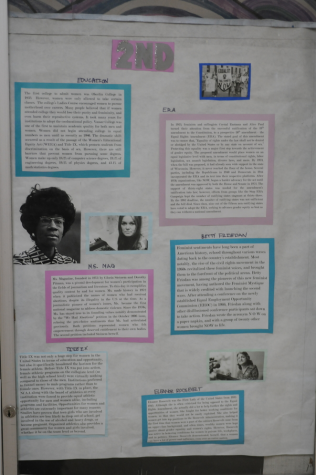Equal Rights Amendment: An Old Proposal Revived
In January 2020, Virginia ratified the Equal Rights Amendment, allowing the proposed amendment, which prohibits discrimination based on sex, to meet the requirements it needs to be adopted into the Constitution.
Created by the Bronx Science National Organization for Women (NOW) club, this presentation displayed on the third floor of Bronx Science highlights key aspects of the 1st, 2nd, and 3rd waves of feminism.
When Alice Paul, co-founder of the National Women’s Party (NWP), envisioned the future of America in 1923, she wished for one thing above all else: equality between the sexes. While working with other prominent suffragists like Elizabeth Cady Staton and Suzan B. Anthony, Paul was able to get the 19th Amendment added to the Constitution. After the success of the 19th Amendment, Paul sought to revise the Constitution again. Through the Equal Rights Amendment (ERA), Paul tried to ensure that people were seen as equal in the law regardless of their sex. To Paul, the addition of the ERA into the Constitution would guarantee women protection from being discriminated against in legal matters. Though Paul fought hard to get the ERA ratified throughout her life, she passed away before she could witness the fruits of her labor.
Recently, the ERA has resurfaced because of a decision made by the Virginia General Assembly this January 15th, 2020. With a 59-41 vote in its House of Delegates and a 28-12 vote in its Senate, Virginia voted in favor of ratifying the ERA. Virginia’s ratification of the ERA is monumental because, with its ratification, the ERA now has the support of the required number of states to get it added to the Constitution.
There is a two step process for adding an amendment to the U.S. Constitution. First, the amendment has to be passed by Congress. Once passed, the amendment must be ratified by thirty eight states. With Virginia’s decision to be the 38th state to ratify the ERA, the ERA may become the 28th Amendment of the U.S. Constitution.
If adopted, the ERA could have a major impact on the lives of women all over America by making sex a suspect classification. Suspect classifications are characteristics that a court examines when an individual claims they were discriminated against. Suspect classifications can be examined to show that a policy is unconstitutional as it discriminates against a specific characteristic of an individual. Currently there are four widely accepted suspect classifications: race, religion, national origin, and alienage. Though the 14th Amendment and the 1964 Civil Rights Act both prohibit women from being discriminated against based on their sex, neither make sex a suspect classification. If sex were to become a suspect classification through the ERA, supporters argue that women would have even more protection against discrimination. “The ERA would provide a legal basis to not discriminate against women. It would be ingrained in our country’s framework,” said Peter Haywood ’21. Some students also believe that the ERA is long overdue. “I agree with the Equal Rights Amendment and what it stands for, but it makes me very sad that in this day and age we still have to ratify an Equal Rights Amendment because there are not equal rights for all American citizens,” said Lara Belton ’21.

Here, information on the second wave of feminism is given. Notably, the Equal Rights Amendment (ERA) is given its own textbox as many, including members of NOW, fought for the ratification of the ERA in the 1970s during the women’s movement.
Though 38 states have now ratified the ERA, Virginia’s ratification of the ERA has sparked debate. Those who oppose adding the ERA into the Constitution cite the bill’s ratification deadline as proof that a change to the Constitution does not need to follow Virginia’s decision. On January 6th, 2020, the Office of Legal Counsel in the Justice Department held that Congress had the power to put a deadline on when the ERA could be ratified. When the deadline came in 1982 and only 35 states had ratified the ERA, the bill died, and many claim that Virginia’s ratification of the ERA does nothing to change that.
Aside from its ratification deadline having passed, another key reason some oppose the ERA lies in the fact that the amendment is gender-blind. A gender-blind amendment could lead to the abolishment of pre-existing policies aimed at helping women climb the social ladder. As the ERA does not distinguish between the sexes, it could lead to a scenario where men claim that policies meant to protect and help women specifically are sexist against them.
The ERA’s text also speaks of sex instead of gender. As the ERA focuses on an individual’s sex and not an individual’s gender, the ERA could potentially exclude people who identify as transgender, non-binary, or who are genderqueer. The first section of the ERA states: “Equality of rights under the law shall not be denied or abridged by the United States or by any state on account of sex.” The two other sections of the proposed amendment do not make it clear how the ERA impacts the lives of people who are not cisgender.
Though there are concerns about adding the ERA into the Constitution, progress has been made in the endeavor. On February 13th, 2020, the U.S. House of Representatives voted to remove the deadline on the Equal Rights Amendment. Though this could be a step forward for the ratification of ERA, there is still ambiguity as to whether or not Congress can change the 1982 deadline. Senate Majority Leader Mitch McConnell has said that he “personally is not a fan of the ERA,” making it unlikely that the ERA would pass in the Senate if it went for a vote. As of now, it is clear that only time can tell whether or not the ERA will be adopted into the Constitution.
“The ERA would provide a legal basis to not discriminate against women. It would be ingrained in our country’s framework,” said Peter Haywood ’21.
Jamie Lee Nicolas is an Editor-in-Chief of the ‘The Science Survey.' Jamie enjoys journalistic writing because it allows her to express her opinions...











